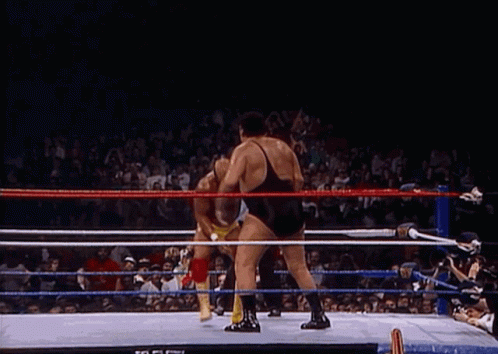The Mundane Hulk

When I heard that Hulk Hogan died, I didn’t think about Terry Bollea.
I thought about being seven years old, sitting too close to the TV, watching WrestleMania III. I thought about the way Hogan’s music hit—"Real American" crackling through grainy speakers—and how the whole room went away, and I was right there in the Pontiac Silverdome with 93,173 other people watching as it happened.
I was a Hulkamaniac. Still am, in that strange, bruised part of childhood that never quite grows up.

But Terry Bollea? I don’t know that guy. I know of him—the scandals, the lawsuits, the racism caught on tape, the bitterness and ego and Gawker and Peter Thiel and the weird butterfly effect that maybe helped kill journalism as we knew it. But that’s not who pinned the Iron Sheik at Madison Square Garden. That’s not who slammed The Giant, or tag teamed with Savage, or turned heel with Hall and Nash.
So where does Hulk end and Terry begin?
That question isn’t new to me. I thought about it a lot as I researched and wrote my biography of Texas Jack. Long before Hogan was flexing in red and yellow spandex, there were other men who figured out the power of persona: Texas Jack, Buffalo Bill, and Wild Bill. Omohundro, Cody, and Hickok—real men who lived rough lives in the American West and then turned those lives into theater. Literally. They put on their fringed buckskins and their Stetson hats, told the crowd they were the real deal, and walked onto a stage to play exaggerated versions of themselves. I wondered then, and still wonder now, how much of what I know is “Texas Jack” versus John Omohundro. After some amount of time has passed, the line of demarcation between fact and fiction, person and persona, life and legend is blurred to the point of disappearing altogether.
That’s the weird alchemy. At some point, the myth eats the man.

We saw it again with Paul Reubens. Pee-wee as Himself, that recent HBO documentary, pulled the curtain back on a guy who spent decades pretending to be someone wide-eyed and ageless. Even in his final interviews, facing terminal cancer, Reubens occasionally veers into character, maybe because he understood that the boundary between him and Pee-wee had long since blurred, maybe because the performance and the performer aren’t so easily defined.
Same with Hogan. If you told me tomorrow that Terry Bollea died of a heart attack back 2007 and Hulk Hogan kept going out of sheer willpower and late-stage American mythology, I probably wouldn’t argue. For millions of people—including me, once—the man was heroism personified, more Superman than Jesse the Body. He preached the "Demandments" like gospel: train hard, say your prayers, take your vitamins, believe in yourself. He bled red, white, and blue, though maybe not always in that order, and served as a caricatured cartoon stand-in for America itself: roaring, ripped, and righteous.

But then the mask slips. And what you find underneath isn’t always heroic.
The man behind the Hulk didn’t live up to the character. He sold out his coworkers. He said things you don’t come back from. He backed corporations over peers and ducked the moral weight of the world he helped shape. The man lived to 71. Many of the men he stood shoulder-to-shoulder with—Junkyard Dog, Big Boss Man, Mr. Perfect, Owen Hart, Macho Man—didn’t make it to 50.
And still, when I heard the news, I felt something.
Not for Terry Bollea. But for Hulk Hogan, the larger-than-life character I completely bought into. As a kid, his showdown with the Iron Sheik didn’t feel like just another match. It felt like America versus Iran, or maybe America versus anywhere or everywhere else that wasn’t America. Later, his feuds with Andre the Giant, Macho Man Randy Savage, even Zeus Lister in No Holds Barred—they all mapped cleanly onto some primal battle between good and evil.
And because of Hogan’s schtick, good always had a shot. No matter how bad it got, even when evil landed its finisher and stood over good like the story was over, good could still rally. Rise to its feet. Wag a finger in evil’s face while shaking its head like “not today.” And then, buoyed by the support of its friends and cheers of its allies, good could sling itself against the ropes, drop a metaphorical leg, hang on for the three count, and pin evil’s ass.
I may no longer believe in Terry Bollea. But I still want to believe in that.

There’s a certain kind of sadness to these men who become myths. They give us something larger than life, but they can’t live there. The stage is a lie, the ring is a lie, the buckskins and boas and bandanas are all lies—but they’re true in the way good stories are true. We need the myth, even when the man behind it lets us down.
And when that myth cracks and the mask slips and we’re left staring at the ordinary face of the life beneath the legend, we end up holding both halves, never quite sure which one deserves our grief.
So yeah. Rest in peace, Hulk Hogan. Not you, Terry. But the man I thought you were.
Quillbilly Matt
Matthew Kerns is the Spur and Western Heritage Award–winning author of Texas Jack: America's First Cowboy Star.
Explore more of his western writing at dimelibrary.com »


